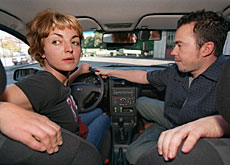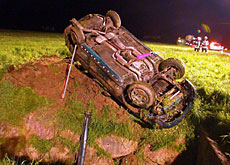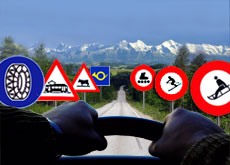Young drivers face tough new rules

From Thursday new drivers who have passed their tests in Switzerland will be on a three-year trial period before they can receive their full licences.
The government wants young people to undergo a mandatory two days of extra training during this time as a way of cutting the high number of road accidents caused by new drivers.
The new rules affect all those who apply for their first provisional licence for cars and motorcycles after December 1.
Officials say the move is designed to improve road safety. Statistics show that new drivers were involved in 3,883 accidents in 2004, more than double the number caused by over 65-year-olds.
Driving accidents are said to be the primary cause of death of 18- to 24-year-olds.
“Their lack of driving experience, tendency to be overconfident, peer pressure, and alcohol can be a highly explosive mixture,” Jolanda van de Graaf from the Swiss Federal Roads Authority told swissinfo.
“Therefore it is essential that young people are accompanied [by these measures] during the first three years of driving.”
Two-phase instruction
The first day of instruction, to be attended within six months of passing the test, is designed to improve the driver’s awareness and anticipation of dangerous traffic situations. It involves time spent practising on a driving circuit.
The second day, to take place within three years, is aimed at helping candidates improve their self-assessment and traffic skills, as well as their behaviour towards other road users.
It includes a drive with a specially trained instructor and other new drivers who will then offer feedback.
In addition, if a driver is disqualified or has the licence withdrawn during the three-year period, the probationary status will be extended a year.
If offences happen again, the licence will be withdrawn and a new learner’s licence will only be issued after a year, following a report by a traffic psychologist.
Mixed views
Driving instructors have mixed views on the new regulations. Ravaldo Guerrini, from the association of driving instructors in eastern Switzerland, called the measures a step in the right direction in preventing accidents.
“It’s a good message for young drivers,” he told swissinfo. “Not all young drivers are happy with this but if you are driving normally [the probationary period] is not really going to be a problem.”
Jürg Schneider, a driving teacher working in the Swiss capital, Bern, welcomed the tougher rules for driving offences, which he said could be a deterrent.
But he told swissinfo he was more sceptical about the training. Schneider felt the first part might encourage new drivers to drive at their limits by teaching them how to manage dangerous situations and the second part could end up being a “pleasure ride” rather than a useful exercise.
“It would be better in my view for the test level to be raised a bit and for some people to be prevented from driving for a while when it’s clear that they shouldn’t be on the roads,” he said.
Costs
Another issue is money: the new courses are expected to cost SFr800-600 ($609-457). This is in addition to the four-part programme – theory test, practical lessons, first aid and a traffic awareness course – that learner drivers already have to undergo.
In total, costs for these four parts already amount to at least SFr2,500, taking into account 20 driving lessons and adminstrative fees for the test and the provisional and full licences.
In the past few months the cantonal authorities have reported huge demand from young people eager to apply for their licence before the new regulations come into effect.
“There are cantons where the level of enquiries has increased by up to 50 per cent,” Sven Britschgi of the association of road transport offices told swissinfo.
The Swiss Federal Roads Authority is confident that the new measures will help save lives and reduce health costs relating to personal injuries after accidents.
Experiences from other countries seem to support this view. In neighbouring Austria, which introduced a similar system in 2003, the number of accidents caused by 18-19 year-olds in the first half of 2005 dropped by 11.2 per cent compared with 2003.
swissinfo, Isobel Leybold-Johnson
According to the Touring Club of Switzerland (TCS), in 2004 new drivers were involved in 3,883 accidents.
Road accidents are said to be the most common cause of death for the 18-24 age group.
The TCS says that the number of accidents caused by new drivers falls to under 1,500 per year three years after taking the test.
On December 15 the Senate is due to discuss a motion calling for the theory exam to be taken in one of the three main Swiss languages – German, French, Italian – only.
At present it can be taken in most cantons in up to nine languages, including English, Albanian and Turkish.
The government has already rejected the motion saying that it might shut people out from some professions and that it was up to the cantons to decide.

In compliance with the JTI standards
More: SWI swissinfo.ch certified by the Journalism Trust Initiative



You can find an overview of ongoing debates with our journalists here. Please join us!
If you want to start a conversation about a topic raised in this article or want to report factual errors, email us at english@swissinfo.ch.